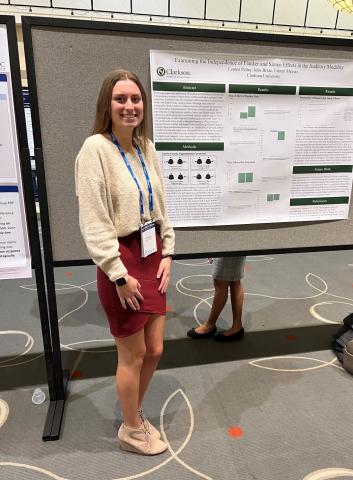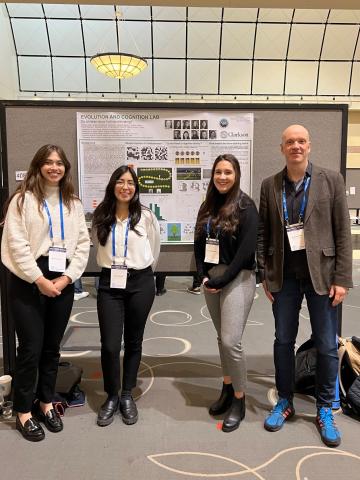Clarkson Psychology Professors and Students Present at 63rd Annual Psychonomic Society Meeting
Psychology Professors Lauren Petley and Andreas Wilke, along with several of their students, recently attended the 63rd annual meeting of the Psychonomic Society, the preeminent society for the experimental study of cognition. The conference was held Nov. 17 - 20 in Boston. Professor Petley gave a talk, and Clarkson had several undergraduate students who presented research posters.

In Dr. Petley’s Hearing and Attention Lab, they study the interactions between hearing and cognition. Their recent work has focused on executive function, which is the highest neural level of behavioral control. Executive function makes many behaviors possible, such as maintaining task-relevant goals, prioritizing task-relevant sensory information, and resolving conflicts. The vast majority of research on executive function uses visual tasks, thus our theoretical understanding may not truly reflect how it operates in the real world, where the brain must contend with multisensory stimuli. Petley and her students are one of the few groups studying how executive function operates in the auditory modality. At Psychonomics 2022, she and her student Julia Brzac presented two studies examining their auditory version of a classic executive task known as the Flanker Task, which is used to measure the brain’s capacity to resolve task-appropriate and inappropriate responses.

Professor Wilke’s lab is the Evolution and Cognition Lab. His students (Gracie DeLaBruere, Hannah Spilman, and Yadhira Garcia) presented on his NSF-funded project examining statistical thinking in children. The study is an international project involving data collection both in Potsdam, NY and in Berlin, Germany. Their work focuses on the tendency to perceive illusory streaks or clumps in random sequences of data—the hot hand phenomenon—that has been identified as a human universal tied to our evolutionary history of foraging for clumpy resources. The current research investigates how misperception of randomness and ecologically relevant statistical thinking develop ontogenetically. Based on their work with adults, the lab team developed three iPad-based decision-making tasks to assess how 3- to 10-year-old children will decide if sequential events will continue in a streak or not, what their understanding of randomness is, and at what cognitive developmental stage the ability to reason in spatially dependent terms if formed. Data collection for this study is run in collaboration with the SUNY Potsdam Child Care Center (SPCCC), the North Country Children’s Museum (NCCM), and FRÖBEL Kindergartens in and around Berlin.
The Psychonomic Society was formed nearly 60 years ago. The mission of the society is to foster the science of cognition through the advancement and communication of basic research in experimental psychology and allied sciences. Click here to learn more: https://www.psychonomic.org/page/about
